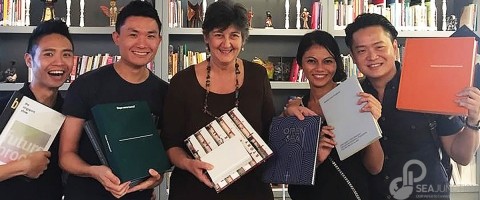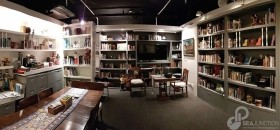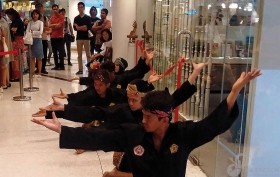The ‘Southeast Asia Junction’ (or SEA Junction for short) is a ‘knowledge venue’, an event space, a hub, a gallery, a library with the goal of fostering understanding and appreciation of Southeast Asia, from arts and crafts to the economy, politics or development. As a space, SEA Junction provides knowledge resources and promotes exchanges among students, specialists, and the general public. SEA Junction opened its doors on 15 May 2016 in the Bangkok Arts and Culture Center (BACC) in the Siam area of downtown Bangkok. The BACC holds a strategic location close to major universities with Southeast Asian interests and is easily accessible to the general public and visitors. The physical space is an open library or ‘reading room’ containing books in English and regional languages; work stations also let visitors use online resources. The space is not all books: arts and crafts from around the region decorate the space and show visitors some of its cultural richness, from papier-mâché figures from the Philippines and Burma to the paintings of emerging regional artists.
Making resources available is the first priority of SEA Junction; an ‘intellectual salon’ open to all, where people need not pay to visit. Anyone can come have a cup of coffee or tea, take a look at the books, browse art objects, and participate in activities such as lectures and workshops. Staff and volunteers operate the reading room six days a week. So far, the library features more than 1300 books, most of which have been catalogued, in addition to a sizeable e-library including sources in PDF format for downloading. SEA Junction maintains an online presence through its website, www.seajunction.org, which also provides a space for photographic essays and opinion pieces. Through the website, Facebook, and Twitter, SEA Junction gathers and shares information on conferences, courses, and fellowships of interest to academics and practitioners. Underlying SEA Junction is the idea of networking: both for the users and for the people who share their knowledge and experience through lectures, books or other modes of communication. This is a space for all kinds of people to make personal contacts, whether they be artists, intellectuals or representatives of groups and organizations, from the region itself or from elsewhere.

Rosalia Sciortino, founder and director, receiving donation of art books on Singapore and Southeast Asia from Plural Art of Singapore.
A great priority of SEA Junction is events; from photographic exhibitions to panel discussions, to show the richness of the region and also the challenges it faces. SEA Junction is thus neither wholly about arts and culture, nor about development, politics or economics. Being in Bangkok provides a central location within Southeast Asia for exchanges among people from the region and beyond. Music performances and film showings have profiled emerging artists, intellectuals, and practitioners from the region, while Southeast Asia-related events have featured both ASEAN-wide phenomena, such as migration, medical tourism and human rights, and country-specific events that would normally be difficult to find outside their home countries. The larger meeting spaces of the BACC also allow SEA Junction to offer more formal programs, including meetings, seminars, lectures and large exhibitions.
In the last year alone, SEA Junction has held public lectures, including ‘In Search of Social Justice along the Myanmar and China Oil and Gas Pipeline’, ‘Chinese Tourism in Southeast Asia: A Blessing for All?’, and ‘LGBT Rights Under Siege in Indonesia’. Photo exhibitions have included ‘Harsh Life on Shore: Migrant Workers in the Thai Fishing Industry’, and ‘Facing Trance in Indonesia’. For music, there were angklung classes and a concert of the Bang Khnai music band. One of the documentary screenings was of ‘Pulau Buru: Tanah Air Beta/Buru Island; My Homeland’, and involved talks by director Rahung Nasution and producer Whisnu Yonar. Other events include potluck parties, mini book fairs, and book launches, while still others fall under the rubric of ‘outreach’, such as classes for students. Recently a group from a nursing school in Indonesia came and gave a class on the impact of regional integration on health.

SEA Junction space
Behind SEA Junction stands the anthropologist and international development specialist, Dr. Rosalia Sciortino, or ‘Lia’, who has lived and worked in the region for the past twenty-five years. Before starting SEA Junction, Lia worked extensively in the foundation and development world, including as regional director for Asia at the Rockefeller Foundation in Thailand, the International Development Research Centre in Singapore, Senior Advisor to AusAID in Indonesia, and as a Ford Foundation officer in Indonesia and the Philippines. She has held managerial positions for projects through the Canadian and Australian governments, when she worked on issues of health and migration. More recently, she has been teaching as an associate professor at the Institute for Population and Social Research (IPSR) at Mahidol University in Bangkok, and is also a visiting professor for the Master Course in International Development at Chulalongkorn University, also in Bangkok. During her work and decades-long presence in Southeast Asia, Lia has seen the need for a cultural center for the region. She has observed how those centers that do exist are inside universities, and so are usually not open to the general public. “Through my years working with the Ford Foundation, IDRC and the Rockefeller Foundation and the many programs to better understand and address emerging challenges in the region, I felt there was a gap between the production of knowledge in academic centers, international and government agencies and civil society groups and the distribution to intended beneficiaries. A lot of Southeast Asia centers are in universities, but they are not accessible to the public. More importantly, the knowledge is not shared widely to ensure informed public debates,” Lia says. The few open venues in the region do not have a special focus on Southeast Asia and do not encourage conversations and exchanges on regional concerns between all the people involved in them. After the ASEAN Economic Community was launched in 2015, Lia saw how crucial it was to share knowledge about regional processes and their impact to ensure greater awareness. The emergence of the Economic Community represents a gradual shift among the countries and peoples of the region, who have started thinking about their regional neighbors instead of distant, powerful countries in Europe and North America. The long-term disconnect means that people in any one country often do not have a clear understanding of the realities in the countries next door. Decades of ideology, popular media, textbooks and curricula that emphasize historical grievances, often further distort the picture of one’s neighbors.

Pencak silat demonstration at SEA Junction, 25 June 2016
The vision to create the SEA Junction was not Lia’s alone. She shared her passion for the region, its people, and its arts and cultures with her husband O’ong Maryono, an instructor and practitioner of the Indonesian martial art, pencak silat. They saw the need to preserve the diversity of cultural expression that was threatened by nationalism and extremism. The two of them had also amassed a sizeable collection of local art and furniture, a reflection of their multicultural vision, and they sought a suitable venue to display it. Then O’ong died of appendix cancer in 2013. Partly to reengage with the world after her loss, but also to commemorate her late husband and their life together, Lia decided to give form to their shared passion for the region with a place where people could experience the richness of Southeast Asia and its arts and crafts, but could also learn about its realities and challenges. “Making the SEA Junction was a crucial part of the grieving process,” Lia said recently. “Building it up helped me feel engaged with the world again. I get energy from working with young people and people who are engaged in the arts and lives of Southeast Asia.”
Support from like-minded individuals has been crucial; SEA Junction is sustained through a system of ‘founding partners’ who donated $2,500 each or pledged $900 a year for 3 years. They come from different countries and backgrounds, but share a common interest in Southeast Asia and a readiness to share their knowledge, expertise and extensive and varied networks. SEA Junction has also benefitted from the generosity of smaller donations from individuals known as ‘Friends of SEA Junction’, and grants from Partners Asia, the Heinrich Böll Stiftung, and the Kennedy Foundation of Thailand. The book collection has been built through the donation of books from many people, especially Alan Feinstein, Executive Director of the American Indonesian Exchange Foundation in Jakarta, who is also a former colleague and family friend. Today SEA Junction stands as a symbol of collective efforts and shared values.
Reflecting Lia’s own interests and networks, many of the events have focused on Indonesia, providing a rare opportunity for people of Thailand and the rest of Mainland Southeast Asia to be exposed to their Island neighbors. At the same time, Lia is very much interested in expanding coverage of the region in all areas, and is always looking for experts and practitioners both from inside and outside the region for events. Lia, her staff, and all the founding partners of SEA Junction would like to extend a warm welcome to everyone to come and visit, make use of the library and other resources, take part in events, consider holding a lecture or workshop, or contribute to its running and activities. Anyone interested is encouraged to contact SEA Junction directly.
Patrick McCormick has held positions at the University of Zurich and the École française d’Extrême-Orient in Yangon. He is currently an independent researcher and consultant based in Yangon (mccormick.yangon@gmail.com).
SEA Junction can be reached through www.seajunction.org and southeastasiajunction@gmail.com
Source: IIAS, The Newsletter 78 Autumn 2017: https://iias.asia/the-


